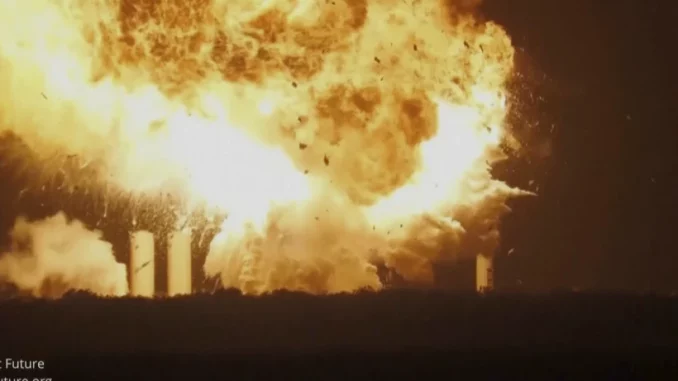
| Published June 27, 2025
🇲🇽 Mexico Investigates Environmental & Legal Concerns
-
What happened?
On June 18, 2025, a SpaceX Starship rocket exploded during a test at the Starbase facility in Brownsville, Texas. Debris—including metal, plastic, gas tanks, aluminum, and steel fragments—scattered into northern Tamaulipas, Mexico. -
Environmental contamination:
Mexican President Claudia Sheinbaum confirmed on June 25 that there is environmental contamination across the border, and her government has launched an official investigation. Agencies such as Protección Civil, Profepa, and Semarnat are analyzing debris, water, sand, and burns in the region. -
Legal review & potential lawsuit:
Officials are reviewing both Mexican and international laws to determine accountability. President Sheinbaum has stated that Mexico may pursue legal action against SpaceX, evaluating any violations of environmental or international regulations. -
Proximity concerns:
Governor Américo Villarreal of Tamaulipas is conducting a study on whether SpaceX’s facility is violating regulations by operating too close to populated areas.
🚀 SpaceX Response & Debris Recovery Issues
-
-
Debris recovery efforts –
SpaceX reports that unauthorized individuals have trespassed onto private property in Mexico, interfering with the company’s ability to recover debris. The company has formally requested cooperation from both local and federal Mexican authorities, emphasizing that all Starship debris remains the legal property of SpaceX. -
Health and safety assurances –
SpaceX maintains that there are “no hazards to the surrounding area,” citing results from independent toxicity tests that allegedly confirm no chemical or biological threats from the fallen rocket materials. The company urges a fact-based response over political overreach or media-driven panic.
-
✅ Statement of Facts
-
-
June 18, 2025 – A SpaceX Starship rocket exploded shortly after liftoff from the company’s Starbase launch site in Brownsville, Texas, raising fresh concerns about the risks of commercial spaceflight near national borders.
-
Debris fallout – Metal fragments, gas tanks, aluminum, and plastic debris were reported to have landed in northern Mexico, particularly in the state of Tamaulipas.
-
Mexican response – President Claudia Sheinbaum confirmed the cross-border incident on June 25, stating that early investigations show signs of environmental contamination on Mexican soil.
-
Government action – Mexican federal agencies, including Protección Civil, Profepa, and Semarnat, have launched a full-scale investigation, conducting environmental tests on soil, water, and sand.
-
Legal escalation – President Sheinbaum noted that legal action under Mexican and international law is being considered, potentially including a lawsuit against SpaceX.
-
Safety concerns – Tamaulipas Governor Américo Villarreal raised alarms over the close proximity of the launch facility to populated areas, prompting calls for stronger zoning and safety regulation enforcement.
-
SpaceX response – The company acknowledged the incident but insisted there is no threat to public health, citing its own internal toxicity assessments.
-
Complications in cleanup – SpaceX also stated that recovery efforts in Mexico have been hampered by unauthorized individuals entering private land, obstructing proper cleanup and investigation.
-
Pattern of failure – This marks SpaceX’s fourth Starship explosion in 2025 alone, following similar test failures in January, March, and May—all resulting in falling debris and growing scrutiny of safety protocols.
-
 Bottom Line:
Bottom Line:
The aftermath of the June 18 SpaceX rocket explosion has triggered a growing diplomatic and environmental response, with Mexico launching an investigation into possible contamination and violations of national law. While SpaceX insists the debris poses no health threat, the discovery of foreign rocket parts on sovereign Mexican soil raises serious questions about cross-border responsibility, environmental stewardship, and the limits of global aerospace authority. As both nations proceed with inquiries, the situation highlights the urgent need to prioritize national interests, enforce clear jurisdictional boundaries, and hold private space companies fully accountable when operations impact neighboring countries.





Be the first to comment